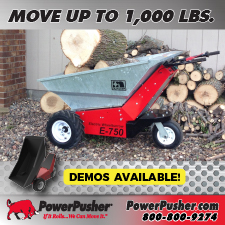Rental Center: A family affair
The Gross' second generation enters the world of equipment rental.
Country True Value was once just a retail hardware store, serving two locations in the Albany, New York area. Three brothers, Joe, Nick and Tony Gross, opened their first True Value store in Troy, New York in 1978, then opened their East Greenbush location a few miles down the road from their original store in 1989. It provided a good living for the three families.
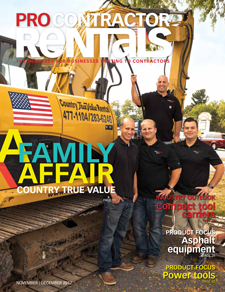 |
| Cousins (left to right) Steve, Anthony, Nick and Mark Gross came into the Country True Value operation as it expanded into heavier equipment rental. It’s proven to be a smart move that allowed the family hardware operation accommodate four family members. |
However, when Joe’s son, Anthony; Nick’s sons, Nick and Steve; and Tony’s son, Mark, wanted to join the business starting in 2004, it was clear the organization had to diversify to support four more families. Equipment and party rentals seemed to be a logical fit.
“The rental and retail operations fit together nicely. It’s fair to say we have one of the larger construction equipment rental operations among conventional hardware retail stores,” says Mark.
“Our first piece of rental equipment was a log splitter that we had on the sales floor that wasn’t moving,” recalls Anthony. “In 2004, we worked with rental experts at True Value to build a $200,000 order for rental equipment. After that, we were able to work with local equipment dealers to fill out our earthmoving and aerial reach equipment line.”
Today, Country True Value offers more than $3 million in equipment inventory for rentals. “The equipment rentals far outpace Upstate Tents and Events, our party and tent rental business,” says Mark, “However, it’s common for someone renting construction equipment from us to also look to us for various seasonal items or even occasionally, party rental equipment.”
Between the two stores, they have 40,000 sq. ft. of retail space, more than 100,000 SKUs and at peak times, 100 employees. Their fathers still work in the retail portion of the business, but the four cousins share equally in the decision-making process of the business. In fact, they all share the same title: rental manager. Each rental manager has his area of focus.
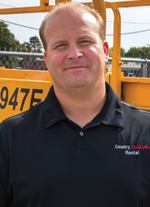 |
| “When rental equipment isn’t ready to go back out on rent, it’s not making us money. Many of our rentals are daily or weekly rentals, so we do everything we can to turn this equipment in the shop so it’s ready for rent as soon as possible. If there are ways we can improve that turnaround, that only helps us,” says Anthony Gross, rental manager. |
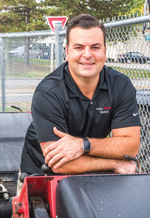 |
| “Sometimes we get customers asking for a specific piece of equipment, but when we ask some questions, it turns out they would be better served with another piece of equipment. We are getting great interest in small stand-up skid loaders because they fit through narrow gates and can work in areas that otherwise would have to be done by hand,” says Mark Gross, rental manager. |
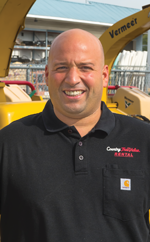 |
| “We are all very familiar with all aspects of the business, and we can jump in and out of each role easily.” -- Nick Gross, rental manager |
 |
|
“We take pride in delivering more than 90 percent of the equipment within one hour of getting the request.” |
“Nick and I look after the Troy store and rental location and Steve and Mark take care of the Greenbush location, which is where most of the construction rental equipment is located,” says Anthony.
Mark focuses on the rental shop and maintaining rental equipment, which ranges from various pieces of light and mid-sized earthmoving equipment, aerial lifts, chippers and small material-handling machines; Nick focuses on inventory tracking and ordering, while Steve focuses on inside rental sales and truck dispatch.
“We are all very familiar with all aspects of the business, and we can jump in and out of each role easily,” Nick says.
They tend to stick with certain brands for specific equipment. Earthmoving equipment tends to be Cat models and larger scissor and boom aerial work platforms are mostly Genie, however, smaller, more-nimble Haulotte aerial work platforms are working their way into the fleet. Toro Dingo stand-up skid-steer units are gaining popularity as are a variety of 8,000- to 10,000-pound mini-excavators. “These are tools our competitors are less likely to have in their fleets and they are matched well to our types of customers and the jobs they do,” says Anthony.
Customer service
The Gross family believes their point of difference in the crowded rental market in the Albany area is the company’s commitment to customer service. “We are open seven days a week and at least one of us is on duty and we are able to deliver equipment. We take pride in delivering more than 90 percent of the equipment within one hour of getting the request,” says Steve.
Country True Value is a well-established name in the Capitol District of Albany with customers reaching a 70-mile radius of its stores. The changing retail and rental scene in the area requires the Gross family to identify their best prospects and provide the services these customers need. “Our rental customers are made up of smaller contractors, subcontractors and serious do-it-yourselfers who take great pride in their ability to tackle home improvement projects. YouTube has helped many more DIYers get the information they need and the confidence to tackle projects they would otherwise hire out,” says Anthony.
To meet DIY customer needs, they ask rental customers many questions about what they are trying to accomplish. “Sometimes we get customers asking for a specific piece of equipment, but when we ask some questions, it turns out they would be better served with another piece of equipment. We are getting great interest in small stand-up skid loaders because they fit through narrow gates and can work in areas that otherwise would have to be done by hand,” says Mark.
The Grosses rely heavily on their sixth sense if they believe a customer isn’t qualified, experienced or confident enough in their abilities to complete the DIY project. “That’s where asking questions makes the difference,” says Nick. “You can tell as the conversation continues whether they understand what’s involved with the project. If we’re not comfortable in their abilities or confidence level, we’ll offer them some names of operators who can help them. More than once we’ve had customers thank us for giving them the names of operators so they could get their job finished.”
Equipment delivery employees go through operator safety training programs and are certified to train operators on-site about using the equipment they deliver. “They have been through Genie’s training program and we also use training offered through the ARA and True Value,” says Steve. “Their online training programs are very helpful in getting employees familiar with ways they can help customers and help them get the right equipment they need for the job. For example, the ARA training has been helpful in getting employees familiar with proper tie-down procedures for hauling heavy equipment,” says Steve.
Online promotion
They tap into Google AdWords to help spread the word about their operation. “We work closely the Dex Media, the Yellow Pages organization, to set up the AdWords and we are finding that it’s tracking just as they predicted,” says Nick.
The Dex Media personnel also helps them monitor incoming sales calls to hone selling skills. “We can listen in on recorded conversations between salespeople and the customer, especially if they are long calls. We can analyze how information is being presented and whether the employee needs further training to better answer questions or handle customer requests,” says Anthony.
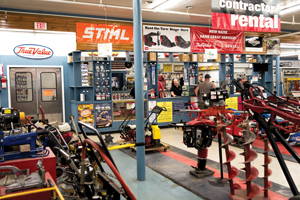 |
| The Gross family finds the equipment rental business and the retail hardware business are a good fit for their operation. |
With its recently revamped web site, www.countrytruevalue.com, customers can quickly reserve equipment rentals online. Although it appears as an online transaction, it sends an email that’s followed up with a phone call by one of the Gross rental managers. “It appears to be an online reservation, but we want to talk with the renter to make sure they are selecting the right piece of equipment and we can better schedule equipment. Where a computer program says ‘yes’ or ‘no’ that a piece of equipment is available, we can use fuzzy logic to juggle rentals and get users the equipment they need,” says Mark.
Country True Value also relies on ad flyers developed through True Value to promote its rental fleet on at least two of the flyer’s pages. “We track sales and rentals to see if there is a boost from the flyer,” says Nick. “We can definitely see a cause and effect from the flyers based on what people come in and purchase.”
Anthony says scan tags that manufacturers are beginning to place on equipment helps improve the renter’s experience. The scan tag links a smart phone to operator manuals and training videos. “Users scan the tag with their phone and access the information. It’s very helpful in reducing calls to us about operating the equipment once it’s on site.”
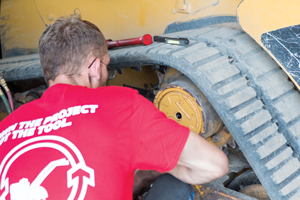 |
|
Country True Value staff uses slower times in the fall and winter to compete predictive maintenance on equipment so it’s ready to rent in the busy spring and summer seasons. |
Keeping it in perspective
The Gross foursome takes great pride in the family operation, however, they all believe they are spread a bit thin at times across the retail and rental operations. “Retail sales is all about 80 percent of the sales coming from 20 percent of the inventory; it’s the same in rental.
It’s challenging to keep the right mix of products to meet customer demand,” says Mark.
The family believes the complementary relationship of the rental and retail operations is a major key to their success, especially with big-box stores and national rental companies all around them.
Anthony wants to find ways to further streamline steps in the operation. “When rental equipment isn’t ready to go back out on rent, it’s not making us money. Many of our rentals are daily or weekly rentals, so we do everything we can to turn this equipment in the shop so it’s ready for rent as soon as possible,” he says. “If there are ways we can improve that turnaround, that only helps us.”
During winter months, rental activity slows, but Mark says that’s when they get a leg up on preventive maintenance and equipment repairs so equipment is reliable and ready to go when the busy spring and summer season hits. “Fortunately, when the rentals slow in the winter, the retail side usually picks up in activity,”he says.
Copyright November-December 2017 issue of Pro Contractor Rentals magazine. All rights reserved.









